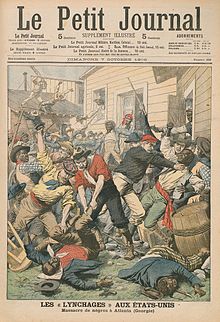Atlanta massacre of 1906
| Atlanta Massacre of 1906 | |
|---|---|
| Part of the Nadir of American race relations | |
 The cover of French magazine Le Petit Journal in October, 1906, depicting the Atlanta race riot | |
| Location | Atlanta, Georgia |
| Date | September 22-24, 1906 |
| Target | African Americans |
| Deaths | 25+ African Americans, 2 white Americans |
| Injured | 90+ African Americans, 10 white Americans |
| Perpetrators | White mobs, and Fulton county police. |
The Atlanta Massacre of 1906 was an attack by armed mobs of White Americans against African Americans in Atlanta, Georgia (United States), which began the evening of September 22 and lasted through September 24, 1906. The events were reported by newspapers around the world, including the French Le Petit Journal which described the "lynchings in the USA" and the "massacre of Negroes in Atlanta,"[1] the Scottish Aberdeen Press & Journal under the headline "Race Riots in Georgia,"[2] and the London Evening Standard under the headlines "Anti-Negro Riots" and "Outrages in Georgia."[3] The final death toll of the conflict is unknown and disputed, but officially at least 25 African Americans[4] and two whites died.[5] Unofficial reports ranged from 10–100 black Americans killed during the massacre.[citation needed] According to the Atlanta History Center, some black Americans were hanged from lampposts; others were shot, beaten or stabbed to death. They were pulled from street cars and attacked on the street; white mobs invaded black neighborhoods, destroying homes and businesses.
The immediate catalyst was newspaper reports of four white women raped in separate incidents, allegedly by African American men. Two African Americans were later indicted by a grand jury for raping Ethel Lawrence and her aunt. An underlying cause was the growing racial tension in a rapidly-changing city and economy, with competition for jobs, housing, and political power.
The violence did not end until after Governor Joseph M. Terrell called in the Georgia National Guard, and African Americans accused the Atlanta Police Department and some Guardsmen of participating in the violence against them. Local histories by whites ignored the massacre for decades. It was not until 2006 that the event was publicly marked - on its 100th anniversary. The next year, the Atlanta massacre was made part of the state's curriculum for public schools.[6]
No comments:
Post a Comment